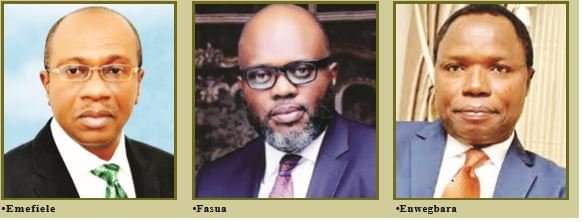
The Coronavirus pandemic has hit the world economies, leaving governments and experts scrambling for immediate solutions to mitigate the harsh consequences of the outbreak on households, and businesses. Assistant Editor NDUKA CHIEJINA reports
UNTIL last February, the world did not realise the danger posed by the COVID-19 pandemic, which took root in the city of Wuhan in China.
The virus has since spread to the rest of the world with catastrophic consequences for the world economies. Businesses are shutting down and disengaging workers, portfolio investors are scampering to safe havens but everywhere seems to be feeling the effect of the COVID-19.
In response to the economic devastation brought on world economies by the Coronavirus, governments all over the world have designed tailor-made stimulus for their economies. In the United States of America (USA), for instance, the Federal Reserve activated a Quantitative Easing measure that drove interest rate down making it easy for businesses to borrow at almost zero interest rates to boost their businesses.
President Donald Trump has secured a $2 trillion stimulus package that will be injected into the economy.
The Central Bank of Nigeria (CBN) rolled out two monetary authorities induced in response to the virus.
Monetary Authorities Stimulus
The CBN first established a N50 billion credit facility for households and small- and medium-scale enterprises (SMEs) hard hit by Coronavirus (COVID-19).
The facility will be given out through the NIRSAL Microfinance Bank for households and small-and medium-scale enterprises (SMEs), including but not limited to hoteliers, airline service providers, health care merchants, etc.
Under this initial stimulus, households can access a maximum of N3 million from the Central Bank of Nigeria’s ?50 billion Targeted Credit Facility for households and small and medium scale enterprises (SMEs). Households and small businesses with verifiable evidence of livelihood adversely impacted by COVID-19 are eligible to draw from this credit facility.
Also in the palliative being rolled out by the CBN is a credit support facility for the health care industry.
CBN Governor Godwin Emefiele said: “In order to meet the potential increase in demand for healthcare services and products, the CBN has opened its intervention facilities, loans to Pharmaceutical companies intending to expand/open their drug manufacturing plants in Nigeria, as well as to Hospital and Healthcare practitioners who intend to expand/build the Health facilities to first-class centres.”
This, he said, is in addition to growing the size of existing interventions to the Agricultural and Manufacturing sectors in Nigeria.
Also contained in the first wave of stimulus packaged by the CBN is interest rate reduction on all applicable CBN intervention facilities from 9 to 5 per cent per annum for 1 year effective March 1, 2020.
All CBN intervention facilities, he said, are now granted a further moratorium of one year on all principal repayments, effective March 1, 2020. “This means that any intervention loan currently under moratorium is granted an additional period of one year.”
Accordingly, participating financial institutions were directed to provide new amortisation schedules for all beneficiaries.
The CBN also granted all Deposit Money Banks (DMBs) permission “to consider temporary and time-limited restructuring of the tenor and loan terms for businesses and households most affected by the outbreak of COVID-19 particularly Oil & Gas, Agriculture, and manufacturing.”
The CBN, Emefiele assured, will “work closely with DMBs to ensure that the use of this forbearance is targeted, transparent and temporary, whilst maintaining individual DMB’s financial strength and overall financial stability of the system.”
Another cushioning measure adopted by the CBN to mitigate the Coronavirus pandemic is the support by the apex bank for industry funding levels “to maintain DMBs capacity to direct credit to individuals, households, and businesses.”
The CBN, the governor said, “will also consider additional incentives to encourage the extension of longer-tenured credit facilities. DMBs were encouraged to continue to build capital buffers to improve the resilience of the sector.”
The second wave of monetary stimulus from the CBN came a few days after the first one. In this case, the CBN announced its decision to increase its intervention in boosting local manufacturing and import substitution by another N1trillion across all critical sectors of the economy.
This is in addition to N100 billion in loan in 2020, to support the health authorities to ensure laboratories, researchers and innovators work with global scientists to patent and or produce vaccines and test kits In Nigeria to prepare for any major crises ahead. The management of the CBN met with the Bankers’ Committee to work out the modalities.
Already, the “Implementation Committee that will action the private sector contribution of N1.5trillion Infrastructure funding that will link farming communities to markets as agreed at the recently concluded “Going for Growth” Roundtable has been set-up.
Given the plunge in the price of oil, which dropped to $25 per barrel with its attendant low accretion to oil revenue, the CBN Governor directed all Deposit Money Banks to increase their support to the pharmaceutical and healthcare industries to enhance local drug manufacturing, increased bed count in hospitals across Nigeria, in funding intensive care as well as in training, laboratory testing, equipment and Research and Development.
Fiscal Authorities Stimulus
In her presentation on the current state of the economy to the leadership of the 9th National Assembly, Mrs Zainab Ahmed, Minister of Finance, Budget and National Planning noted that before COVID-19 and oil price decline, the economy was already fragile, vulnerable and deteriorating.
The crisis, in the words of Ahmed, has been: “Increasing pressure on the naira and foreign reserves as the crude oil sales receipts decline and the macroeconomic outlook worsens.”
Ahmed drew attention to the Nigerian proposed integrated policy framework, where she stated that: “the framework is to be complemented by a fiscal stimulus package to cushion the impact of the crisis on the most vulnerable individuals and communities.”
On the fiscal stimulus package, the key proposals include re-introducing 2012 corporate tax (exemption of profits) order granting job-creation tax rebates for employers; accelerating construction of over 700km of roads and bridges under road infrastructure tax credit scheme; promoting consumer-spending, fiscal strategies and policies; accelerating ease of doing business-related fiscal reforms.
The minister said the fiscal policy coordination will review sectors that are eligible for pioneer tax holiday incentives under Industrial Development (Income Tax Relief) Act; review fiscal incentives under the national automobile policy; review process and approvals of import duty exemption certificates; tax expenditure studies and evaluation of a current suite of fiscal incentives.
Apart from also talking about the Finance Act 2019 implementation, Mrs Ahmed lamented the about key issues and challenges in achieving sustainable, inclusive and diversified growth and development.
The key issues and challenges, in her views, are fiscal dependencies on oil revenues (which pose downside risks for oil production and international oil price volatility); prioritising expenditure (especially investments in infrastructure and human capital against fiscal risks from subsidies); and managing inflationary pressures amid faltering growth.
Addressing the impact of external developments (e.g. COVID-19, oil price decline, global trade tensions, African Continental Free Trade Agreement, etc.), and key execution priorities, Ahmed also considered stimulation of economic activities to create jobs and increase household consumption.
Others include prioritising investments in critical infrastructure and human capital development to unlock the latent growth potential of Nigerians (especially our Youth); accelerating the recovery in Gross Domestic Product (GDP) growth and stemming inflationary pressures.
There are also the issues of raising revenues and resources to finance critical expenditure, service debt and meet other obligations; increasing oil and non-oil revenues to finance priority capital and recurrent expenditures; and enhancing fiscal consolidation to rebuild fiscal buffers and increase resilience against fiscal shocks.
What the experts say
Odilim Enwegbara, a development economist and financial expert who serves as Chairman/CEO at Pan Africa Development Corporate Company (PADCC), told The Nation that the government should have three types of stimulus packages:
First, he called on the government to reduce its debt services because it does not have the money to meet this debt service obligation right now. “So what it needs to is to meet with the creditors and tell them to look give us one-year debt relief or government will bring money and buy back its debt, I am talking about debts priced in naira, not dollar.”
Secondly, he said, the government should have a package for citizens. The government should ask banks to release all account of Nigerians with their BVN those whose accounts are below N50,000. “Any account that is below N50,000 government should send N50,000 into that account and ask the bank to send alert to all Nigerians and tell them this is an emergency loan to you. When the whole thing is over you are going to pay back this money. So people will take it and people will buy the essential thing they need.”
Thirdly, he said: “Government should reactivate AMCON to buy back occasional nonperforming loans of banks especially in the power, oil and gas sectors. The government must do that very quickly.”
In terms of how he thinks the stimulus should cost the government, Enwegbara said: “No matter the amount government has to buy back the debt. The financial debt you know how much it is so that one is gone.
“For citizens, we are talking about ?3trillion to N4trillion to be given to all citizens that their accounts are below N50,000. The government should make sure that banks are transparent in their dealings because the government will ensure that if anybody’s account that is above N50,000 and you paid N50,000 into that account, it means that you (bank) shall be held responsible and the EFCC will come after the bank and the bank will pay a heavy penalty.
“So the government will send alert to every citizen and wish them well and tell them we are in this battle together and we don’t want any Nigerian to go hungry and they don’t want any Nigerian to be penniless in this situation. They should have enough money to buy essential things like food, toiletries and medication. They must do this no matter the cost.
Mr Tope Fasua, a former presidential aspirant, said he was looking at about N3.5trillion stimulus with at least ?1trillion going into local manufacturing as loans and some core critical sectors and also N1.5trillion for infrastructure and another N1trillion or thereabouts for the pharmaceuticals.
According to him, “this is very lean but that is the best that central bank can do even though they held a monetary policy committee meeting which held rate at 13.5%, I think they are just playing it safe because I even know some people who believe they should increase the rate at this time which I think is very ridiculous.”
N3.5trillion, he said, “is certainly not enough given the fact that the fiscal side is chipping off ?1.5 trillion from the budget. So, meaning that they are trying to put about ?2trillion into the economy. However, this is also going in through loans to people who already have businesses.”












